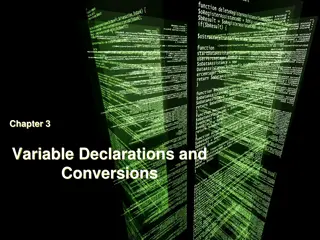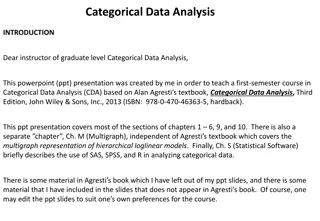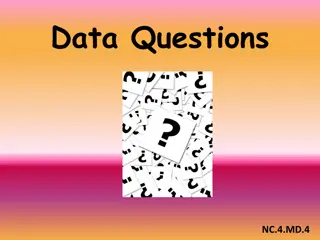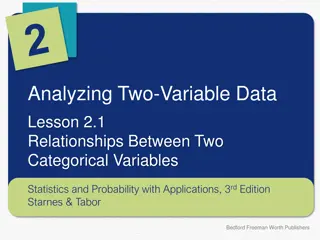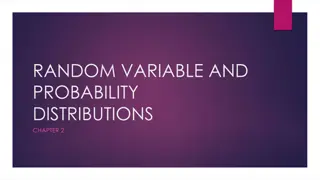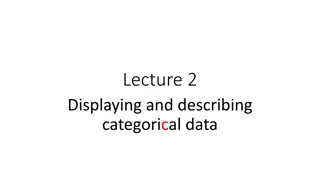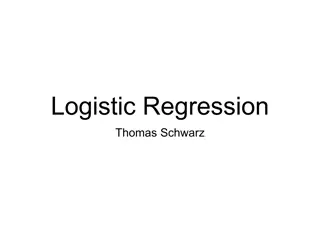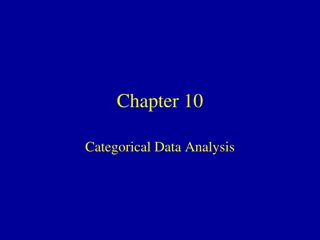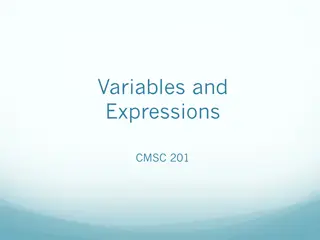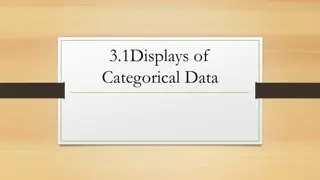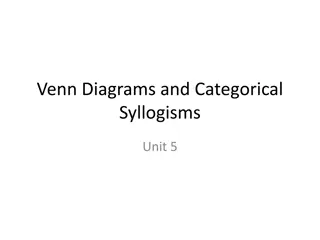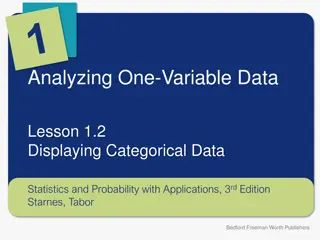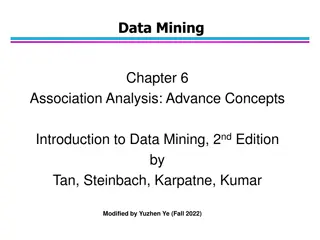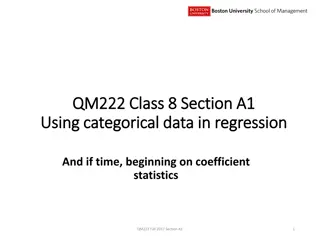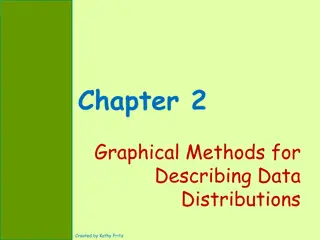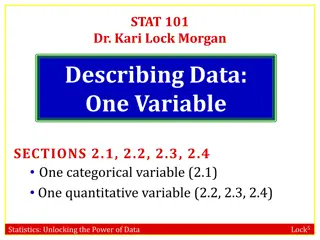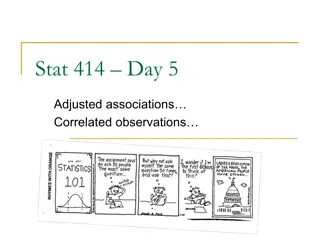Variables in Research Studies
Variables in research studies play crucial roles in examining relationships and drawing conclusions. They include independent variables that influence outcomes, dependent variables affected by independent ones, moderator variables that strengthen or weaken relationships, intervening variables lying
10 views • 34 slides
Variables and Control in Research Design
In research design, variables play crucial roles as either dependent or independent factors, with extraneous variables potentially affecting study outcomes. Controlling for extraneous variables is essential to attribute effects solely to the independent variables. Research hypotheses aim to test pre
6 views • 6 slides
Overview of Categorical Aid in Education Finance
Categorical aid in education funding serves specific purposes such as special education, transportation, and mental health. It operates outside revenue limits and often comes in fixed or prorated amounts. The process involves targeted grants and reimbursement formulas. Special Education & School-Age
1 views • 36 slides
Variable Declarations and Conversions in Java
Properly declaring variables in Java is essential before using them. This chapter covers different types of variable declarations, including class variables, instance variables, local variables, and parameter variables. It also explains the concept of type casting and the importance of explicitly de
3 views • 23 slides
Graduate Level Categorical Data Analysis Course
This PowerPoint presentation offers a comprehensive guide to teaching a first-semester course in Categorical Data Analysis at the graduate level. Covering key sections from Alan Agresti's textbook, the presentation includes real-data examples, software guidance, and solutions to exercises. The instr
6 views • 5 slides
Categorical and Numerical Data in Mathematics
Explore the distinction between categorical and numerical data in math. Learn how mathematicians categorize and analyze data, sorting cards into different categories to understand similarities and differences. Develop perseverance skills by determining survey question types and defining data types w
3 views • 9 slides
Variables in Educational Research
Variables in educational research play a crucial role as symbols of events, traits, or characteristics that can be measured and categorized. Different types of variables such as change, effect, and outcome variables are essential in studying causal relationships. Dependent variables represent outcom
8 views • 17 slides
Analyzing Relationships Between Categorical Variables in Statistics
Explore relationships between two categorical variables in statistics, distinguishing between explanatory and response variables. Learn to create segmented bar charts and identify associations. Understand the importance of identifying explanatory variables in analyzing data relationships. Improve yo
3 views • 15 slides
Random Variables and Probability Distributions
Random variables are variables whose values are unknown and can be discrete or continuous. Probability distributions provide the likelihood of outcomes in a random experiment. Learn how random variables are used in quantifying outcomes and differentiating from algebraic variables. Explore types of r
2 views • 13 slides
Parallel Chi-square Test for Feature Selection in Categorical Data
The chi-square test is a popular method for feature selection in categorical data with classification labels. By calculating chi-square values in parallel for all features simultaneously, this approach provides a more efficient solution compared to serial computation. The process involves creating c
4 views • 4 slides
Variables in Physics: A Comprehensive Guide
This presentation introduces and explains different types of variables in Physics, emphasizing the concepts of independent, dependent, and control variables. It provides practical examples and tips for identifying variables in experiments, aiming to enhance students' understanding of scientific meth
5 views • 24 slides
Visualizing Categorical Data in Data Analysis
Explore methods for displaying and describing categorical data effectively, from frequency tables to bar and pie charts. Understand the importance of visual representation in drawing insights and making comparisons. Dive into examples using football team data and Titanic survivors. Learn to identify
3 views • 20 slides
Analyzing Categorical Growth and Values Table in Accountability Panel
Analyze the growth and values table in the accountability panel through categorical growth and status improvement tables. The subgroups' significance of categorical status changes is assessed using a rating system. Temporary cut scores for sub-categories have been employed for evaluation, with a foc
3 views • 51 slides
Chi-Square Tests in Statistics
Chi-square tests in statistics are used to examine the relationship between categorical variables or test claims about categorical variable distributions in populations. The Chi-square test statistic measures the discrepancy between observed and expected counts, with the Chi-square distribution help
6 views • 16 slides
Binary Outcome Prediction Models in Data Science
Categorical data outcomes often involve binary decisions, such as re-election of a president or customer satisfaction. Prediction models like logistic regression and Bayes classifier are used to make accurate predictions based on categorical and numerical features. Regression models, both discrimina
1 views • 67 slides
Kaseya Fundamentals Workshop - Agent Procedures and Variables Overview
Discover the key aspects of Agent Procedures and Variables in Kaseya Fundamentals Workshop, including Managed Variables, Global Variables, and Public Variables. Explore examples of Agent Procedures and learn about Application Deployment, Windows Registry Modification, and more. Gain insights into Pr
2 views • 23 slides
Categorical Data Analysis for Proportion Estimation
In the realm of categorical data analysis, estimating proportions is crucial for understanding population characteristics. This involves sampling, calculating sample proportions, standard errors, and constructing confidence intervals. Through examples like studying the effects of treatments on medic
0 views • 72 slides
Categorical Data Analysis in Population Studies
Inference methods for estimating proportions in a population are essential in categorical data analysis. This includes techniques for single proportions, confidence intervals, sample size determination, and Wilson-Agresti-Coull method for small sample sizes. Illustrated with examples and visuals, th
0 views • 80 slides
Introduction to Variables and Expressions in Python
Today we start Python! Learn about variables, how to create them, assign values, and perform mathematical operations using variables in Python. Understand the rules for naming variables and how they are essential for storing and managing information in your programs. Explore different types of varia
7 views • 16 slides
Variables in Economics
Variables in economics, such as dependent, independent, endogenous, and exogenous variables, play a crucial role in analyzing economic phenomena. Dependent variables are influenced by changes in other variables, while independent variables are not. Endogenous variables are internal and need to be pr
8 views • 8 slides
Categorical Data Displays and Analysis
Visual displays of categorical data such as bar graphs, pie charts, and frequency distributions help organize and interpret large amounts of data effectively. Different types of graphs serve specific purposes, like comparing categories visually and identifying modes easily. This overview covers the
5 views • 10 slides
Venn Diagrams and Categorical Syllogisms
Venn diagrams, introduced by John Venn, visually represent relationships between different classes. Shading in diagrams signifies empty sets or no overlap between classes. Different types of categorical statements such as universal and particular are illustrated using examples. Explore how Venn diag
1 views • 30 slides
Categorical Syllogism in Logic: A Comprehensive Overview
Categorical syllogism, a form of inference with two premises and a conclusion, is a fundamental concept in logic. This type of deductive argument consists of three categorical propositions - universal affirmative, universal negative, particular affirmative, and particular negative. Terms such as maj
3 views • 16 slides
Displaying Categorical Data: Bar and Pie Charts
This lesson explores the visual representation of categorical data using bar and pie charts. Learn how to create and interpret these graphs to display variable distributions clearly. Understand deceptive graph practices and master the skills to make accurate and informative data displays in Statisti
2 views • 16 slides
Advanced Concepts in Association Analysis: Handling Categorical Attributes
Explore advanced concepts in association analysis, focusing on the handling of categorical attributes. Learn how to apply association analysis to non-asymmetric binary variables, including examples and potential solutions for skewed attribute value distributions. Discover techniques for managing att
3 views • 48 slides
Using Categorical Data in Regression and Interpreting Coefficients
In regression analysis, categorical data can be converted into dummy variables to analyze how they impact the outcome variable. By creating binary variables based on categories like street names, we can interpret coefficients to understand the effect on prices. This process involves constructing dum
7 views • 25 slides
Graphical Methods for Data Distributions
In this chapter, Kathy Fritz presents graphical methods for describing data distributions. It covers variables, data types (univariate, bivariate, multivariate), categorical and numerical variables, and their characteristics. Understand the distinctions between different types of data and variables,
1 views • 70 slides
Natural Sciences Grade 7
Variables play a crucial role in scientific investigations as they are the elements that change and are measured during experiments. There are two main types of variables - dependent and independent. Dependent variables respond to changes in independent variables, which are manipulated by the experi
3 views • 8 slides
Analyzing Categorical Data and Chi-Square Test
Categorical data analysis, contingency tables, chi-square test, likelihood ratio, odds ratio, and loglinear models are vital in statistics. Understanding the theory, assumptions, and interpretation of these methods is crucial for drawing meaningful conclusions from categorical data. Explore examples
2 views • 47 slides
Categorical Syllogisms: Types and Examples
A categorical syllogism is a deductive argument based on the relations of classes (categories) where a conclusion is drawn from two premises involving three terms. In standard form, the premises and conclusion are in categorical form (A, E, I, O), each term occurs twice, and the middle term does not
2 views • 27 slides
Comparing Groups & Summary Plots in Categorical Data Analysis
In this lecture, Professor Michael Hamilton covers methods for comparing groups and generating summary plots in categorical data analysis. Key topics include hypothesis testing, Chi-Squared test, Binomial test, and Test of Equal Proportions. Examples demonstrate how to utilize R for creating tables,
2 views • 31 slides
Describing Data: One Variable - Categorical and Quantitative Examples
The concepts of categorical and quantitative variables in statistics. Learn about the importance of randomization in data collection and the distinction between random samples and randomized experiments. Understand when to use random sampling and randomized experiments for different study objectives
1 views • 59 slides
Exploratory Data Analysis Techniques for Visualizing Relationships in Categorical and Numerical Variables
Explore effective data visualization methods for analyzing relationships between categorical and numerical variables, learn about segmented bar plots, mosaic plots, and side-by-side box plots. Get insights into making inferences and staying aware of Simpson's paradox in statistical analysis.
2 views • 37 slides
Descriptive Statistics and Random Variables
Explore the concepts of descriptive statistics, random variables, measures of centralization and dispersion, and more with Ardavan Asef-Vaziri. Learn about numerical and categorical random variables, modes, variances, standard deviations, and coefficients of variation. Gain insights on variability i
5 views • 9 slides
Random Variables and Expectations in Engineering Applications
This content discusses expectations of random variables and functions of random variables in ECE 313 Probability with Engineering Applications. Topics cover important distributions such as hypo-exponential, Erlang, and hyper-exponential, along with the calculation of expectations for various random
5 views • 26 slides
Insights on Adjusting Associations & Categorical Predictors in Statistical Analysis
Discover the importance of adjusting for correlated observations, understanding heterogeneity impacts, and coding categorical variables in data analysis. Learn about incorporating ecological information, testing variable significance, and more. Explore statistical concepts to enhance your data inter
2 views • 18 slides
Understanding Relationship Dynamics: Independent Variables vs. Antecedent Variables
Dive into the distinction between independent and antecedent variables in research, exploring how antecedent variables precede the focal independent variables to shed light on the genesis of relationships. Learn how these variables play a crucial role in studying phenomena like meditation, happiness
0 views • 6 slides
Advanced Meta-analysis Models Using Metafor in R
Learn how to employ moderators - categorical, continuous, or both - in your meta-analysis using Metafor in R. Explore special cases with categorical moderators, handling multiple independent variables, and utilizing fudge adjustment for mixed models.
2 views • 6 slides
Understanding Global and Local Variables in Python Functions
Explore the concept of global and local variables in Python functions. Global variables are declared outside functions and can be accessed globally, while local variables are defined inside functions with limited scope. Learn how to work with global and local variables, as well as using the global k
1 views • 17 slides
Understanding Variables and Descriptive Statistics
Explore the types of variables - categorical and continuous, along with examples like visits to a shelter, satisfaction scales, and more. Learn about descriptive statistics for both categorical and continuous variables, including frequencies, percentages, means, medians, standard deviations, and ran
1 views • 22 slides



